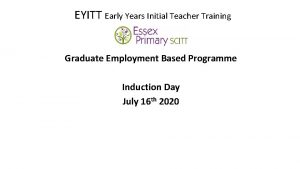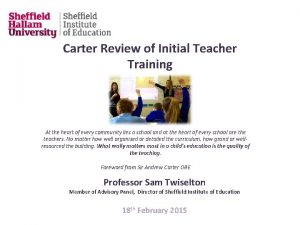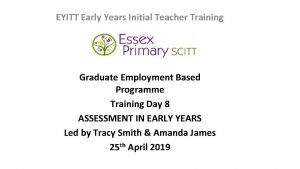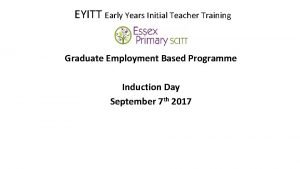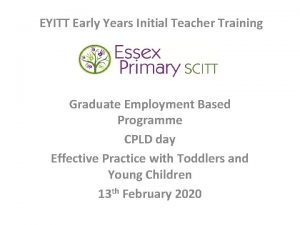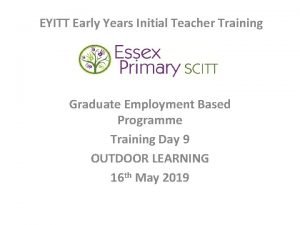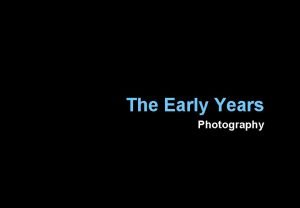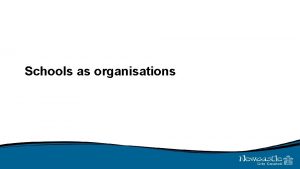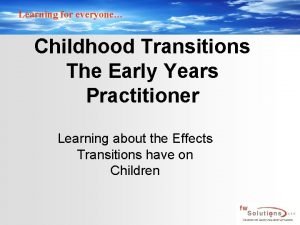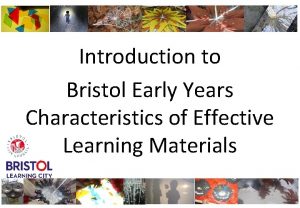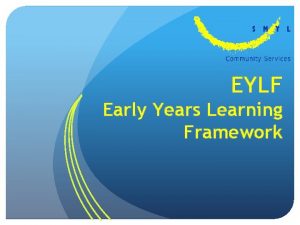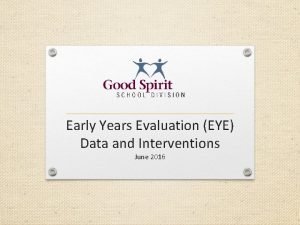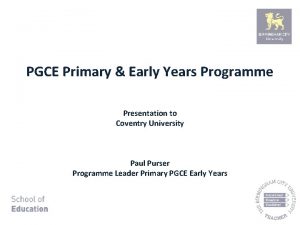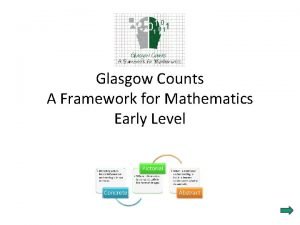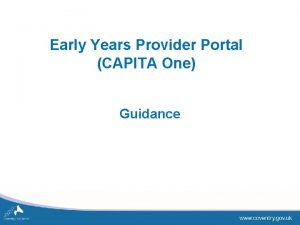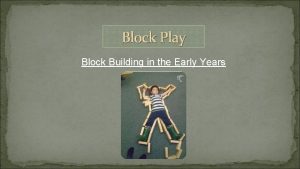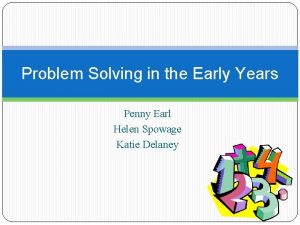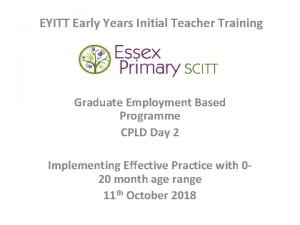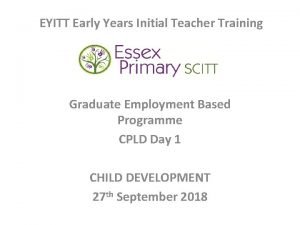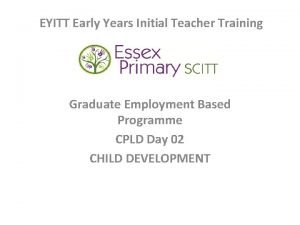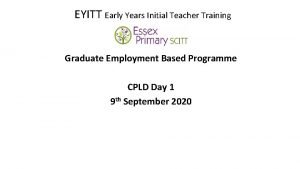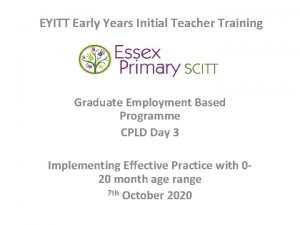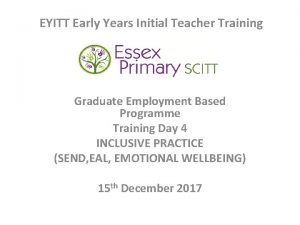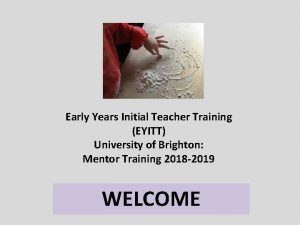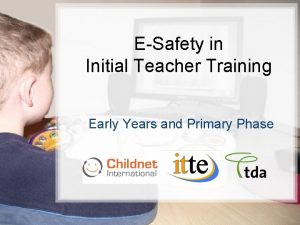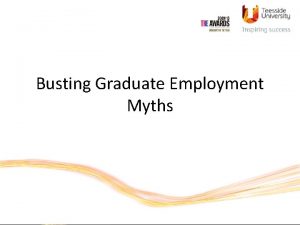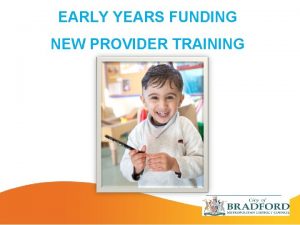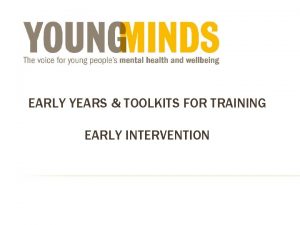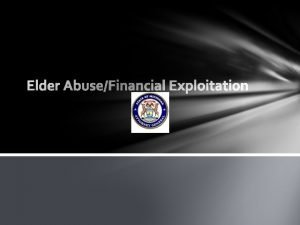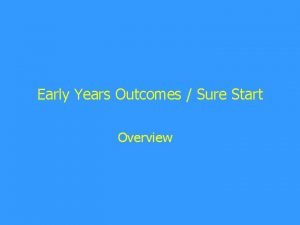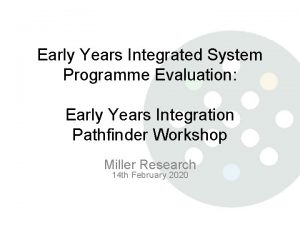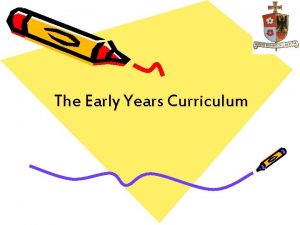EYITT Early Years Initial Teacher Training Graduate Employment





























- Slides: 29

EYITT Early Years Initial Teacher Training Graduate Employment Based Programme Induction Day July 16 th 2020

Objectives for this session… • Have an understanding of the course requirements • Have a deeper understanding of the role of an early years teacher • Understand the placement requirements and expectations including for setting based mentors • Have an understanding of assessment requirements and processes • Have a deeper understanding of the Teachers’ Standards (Early Years) • Begin to critically reflect on current practice and make links to the teacher standards • Start getting to know each other and share ideas!

Contact details Lead Consultants: Amanda James amandajames@e. essexprimaryscitt. co. uk Tracy Goodway tracygoodway@e. essexprimaryscitt. co. uk Nicky Brewis nickybrewis@e. essexprimaryscitt. co. uk EYITT administrator: Claire Rackham SCITTadministrator@newlandsspring. essex. sch. uk Essex Primary SCITT Strategic Director: Fiona Willett fiona@essexprimaryscitt. co. uk

Overview • • Ø Ø • • • Introductions Course information and overview Placement information Support systems- introduction to external mentors Assessment –what and when Top Tips Introduction to the Teachers’ Standards (Early Years) What next… Pre-course tasks Questions and anxieties Plenary

Introductions • External mentors to introduce themselves Trainee’s to introduce by location – share key areas of interest • Essex • Norfolk • Suffolk • Cambs • London

Programme Requirements set by the Df. E R 2. 2 Trainees must teach across the 0 -5 age range and engage with the educational continuum of expectations, curricula and teaching in key stage 1 and 2 (to enable you to do this we hope you will complete a 2 week KS 1 placement in Spring or Summer term) Trainees will be assessed teaching in their place of employment R 4. 1 For the period of their training all trainees must be employed in a setting offering EYFS R 4. 2 Trainees’ working timetable should be no more than 90% of the full time working hours of an Early Years Teacher (other 10% equals half a day a week)

Placements: Different age phase (Optional but highly recommended) • It is highly recommended that, if possible, you gain experience of teaching in a different age phase in your setting • This will give you a more in-depth understanding of both the EYFS Framework and curriculum continuum • You could complete this in any way you wish e. g. one day a week; a two week block; half a term etc.

Placements: Key Stage 1 placement (Optional but highly recommended) 10 day placement at key stage 1 • Should take place in Spring or Summer term • Must be arranged mutually between trainee and school / setting • Placements are required to read the partnership agreement and sign the declaration

Further guidance on placements: • Trainees must not enter any setting until DBS clearance has been received • Trainees are expected to be professional at all times when attending placements • Trainees are expected to adhere to the setting’s local policies and procedures Questions on placements

Partnership agreement Sets out the responsibilities of each partner • Employing setting • Trainee • KS 1 placement (if attending) • Essex Primary SCITT It should be signed by each partner and a copy retained by the trainee in their portfolio, each setting or school and a copy returned to Essex Primary SCITT

Finance • Employing settings receive a financial incentive from the Government of £ 7000 to support trainees to complete the programme • This funding will be paid in 10 equal monthly instalments of £ 700 from October to July through our Attain Academy Partnership • This funding should be used towards the costs incurred by the employer in supporting and employing the trainee over the period of their training • Settings will need to complete a financial audit of how the funding has been spent

How could employers use the incentive… • Salary enhancements • Travel costs for attending training days • Specific resources to support trainees’ on the programme e. g. additional text books • Ensuring the trainee receives 10% non contact time every week • To cover staffing costs to release the setting mentor in order to support the trainee

External mentors Will • Provide advice, guidance and support • Encourage you to think critically and reflect on your practice • Monitor your progress in meeting the standards • Contact you monthly via email / phone as required • Complete 7 formative assessment visits • Support you to develop action plans • Provide ongoing feedback and targets for further development • Flag any cause for concern

Setting mentors Setting mentor support resources – explain the requirements and outline how setting mentors will support trainees through… • Regular meetings to review progress and agree actions to support development • Regular observations of trainee in practice • Joint observations with external mentors and input into progress reviews

Assessment overview Assessment observation visits • External mentors will complete 7 visits, some will be joint with setting mentor • Tracking progress against Teachers’ Standards (Early years) supported by setting mentor • Opportunity to review portfolio and setting plan Written assignments/tasks Professional Portfolio • Change Project –an action • Trainees are required to provide 2 research project undertaken in – 4 pieces of evidence per sub your employment setting standard • Choice of a written assignment • Each piece of evidence should be exploring approaches and clearly annotated and linked to pedagogy in the early years the standards • SST task • Attachment task • Maths tasks • Phonics audit • KS 1 tasks ( optional but highly recommended) • CPLD day interim tasks • Other tasks as required

Assessment criteria Criteria trainees are required to meet…. . . • All 8 Teachers‘ Standards (early years) must have been met in practice • Trainees will have specifically evidenced the 0 -5 age range and the KS 1/2 continuum (where they are able to) • Trainees will have specifically evidenced leadership of practice as in standards 6 and 8 • Trainees must provide evidence of their knowledge , undertanding and hands on practice with young children form birth to five years (where they are able to)

Top Tips…. . Lessons learnt from previous trainees…. • Gather and annotate protfolio evidence as you go (don’t leave it until the end) • Make the most of the reading material and relevant research we provide you with • Be wary of 'what’s app’ groups • Make full use of external mentors and fellow trainees • Be accountable and take responsibility for your own learning

The role of an early years teacher standards preamble • Early years teachers make the education and care for babies and children their first concern • They are accountable for achieving the highest possible standards in their professional practice and conduct • Are graduates who are leading education and care • Have met all the standards in practice from birth to five

• Act with integrity and honesty • Keep knowledge skills up to date and are self critical • Forge positive professional relationships with parents/ carer’s in the best interests of the children

Introduction to the standards 1. Set high expectations which inspire, motivate and challenge all children 2. Promote good progress and outcomes by children 3. Demonstrate good knowledge of early learning and EYFS 4. Plan education and care taking account of the needs of all children 5. Adapt education and care to respond to the strengths and needs of all children 6. Make accurate and productive use of assessment 7. Safeguard and promote welfare of children, and provide a safe learning environment 8. Fulfil wider professional responsibilities

Leadership in the early years Leadership – a key aspect of being an early years teacher “leaders of effective settings were both reflective in their own practice and encouraged reflection in their staff” (Blatchford , 2000) “ A leader shapes and shares a vision which gives point to the work of others” (Handy 1992) Research studies emphasise the importance of effective leadership in early years • • EPPE (Effective Provision of Pre-school Education) ELEYS (Effective Leadership in the Early Years Sector) EPPSE (Effective Pre-school, Primary and Secondary Education) REPEY (Researching Effective Pedagogy in the Early Years) Leadership is about inspiring others to promote a shared vision Standard 8 – must provide evidence of leadership

Standard 8 Spend a couple of minutes reviewing the sub-standards. • 8. 1 Promote equality of opportunity and anti-discriminatory practice. • 8. 2 Make a positive contribution to the wider life and ethos of the setting. • 8. 3 Take a lead in establishing a culture of cooperative working between colleagues, parents and/or carers and other professionals. • 8. 4 Model and implement effective education and care, and support and lead other practitioners including Early Years Educators. • 8. 5 Take responsibility for leading practice through appropriate professional development for self and colleagues. • 8. 6 Reflect on and evaluate the effectiveness of provision, and shape and support good practice. • 8. 7 Understand the importance of and contribute to multi-agency team working.

Exploring the leadership strand “leaders of effective settings were both reflective in their own practice and encouraged reflection in their staff” (Blatchford , 2000) Familiarisation with Standard 8. Review the sub standards and take 10 minutes to consider your thoughts on a) Current areas of strength b) Challenges Discussion activity: addressing the challenges ( Use the ‘chat option’)

Self-audit Start to review your current practice with reference to the Teachers Standards (Early Years) • Identify ways you might begin to evidence some of the standards • Use the Forum page on the SCITT website to add your thoughts over the summer – could use as evidence!

Self audit informs…. . • • The IDP The Setting Plan The Change Project Your evidence base

Website www. essexprimaryscitt. co. uk • Click on login • Select not registered and follow instructions • You will be able to login once your registration has been approved Resources and Forum

Pre-course tasks Begin to complete your safeguarding checklist: Please make sure you have read following guidance regarding your professional role: • Working together to safeguard children (2018) • Keeping children safe in education (September 2019) Copies are available on our website

Pre-course child protection task You will need to complete an online training module from Tes Institute on Child Protection prior to starting the programme (unless you already have recent -within the last year- certified evidence of undertaking this or equivalent training): This is an accredited safeguarding course, delivered by Edu. Care. • This course explains child protection is about protecting children from violence, exploitation, abuse and neglect and keeping them safe from harm. It is about promoting the health and welfare of children and young people helping them to grow up in a safe and supportive environment. It covers Keeping Children Safe in Education. • It is also includes training on the Government’s Prevent Agenda • You can download a certificate of completion to add to your portfolio. • Details of how to access this module will be emailed to you.

QUESTIONS? ? ? Closing thoughts…. ‘A teacher affects eternity; she / he can never tell where his / her influence stops. ’ Henry Brooks Adams ‘Be the change you want to see’ Ghandi
 Eyitt course
Eyitt course Carter review of initial teacher training
Carter review of initial teacher training Eyitt
Eyitt Eyitt
Eyitt Eyitt jobs
Eyitt jobs Eyitt
Eyitt Banegas initial english language teacher education download
Banegas initial english language teacher education download Goat years to human years
Goat years to human years 300 solar years to lunar years
300 solar years to lunar years How long ago was four score and seven years
How long ago was four score and seven years Shakespeare early years
Shakespeare early years First photograph of a person
First photograph of a person Summarise types of early years provision
Summarise types of early years provision Medway early years
Medway early years Effects of transitions in early years
Effects of transitions in early years Bristol characteristics of effective learning
Bristol characteristics of effective learning Early life of henry hudson
Early life of henry hudson Hampshire services for young children
Hampshire services for young children Eylf meaning
Eylf meaning Eye early years evaluation
Eye early years evaluation Developmental milestones 40-65 years
Developmental milestones 40-65 years Pgce early years
Pgce early years Glasgow counts
Glasgow counts Coventry early years portal
Coventry early years portal Block play early years
Block play early years Picasso paintings early years
Picasso paintings early years Mark making reception
Mark making reception Partnership working in early years
Partnership working in early years Penny earl and mark
Penny earl and mark Early years portal hertfordshire
Early years portal hertfordshire
